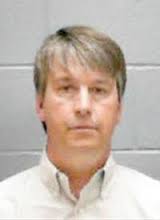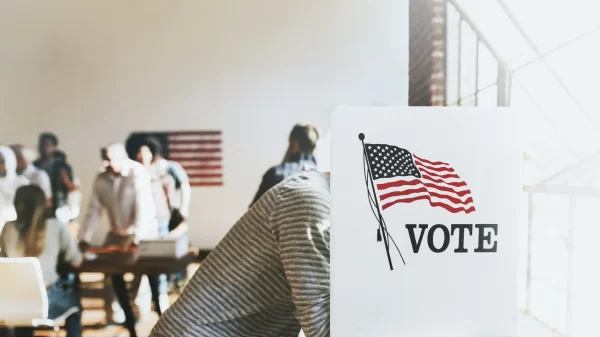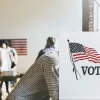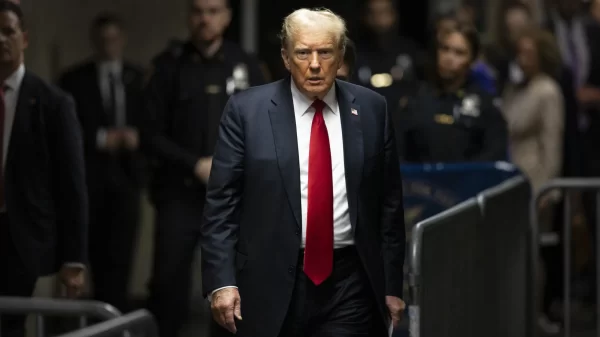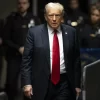By Byron Shehee
Alabama Political Reporter
Opelika — On Monday, Rep. Barry Moore (Enterprise) had his first chance to meet the jury that will decide whether or not he is guilty of the State’s charges against him. Moore is charged with perjury (two counts) and giving false statements (two counts) during a Grand Jury investigation of Rep. Mike Hubbard (Auburn).
The prosecution, which primarily consists of Van Davis, Matt Hart and Mike Duffy, all entered the courtroom promptly at 8:30 a.m., the few members of the legal defense team who were not already in position quickly fell into place.
Before the potential jurors entered the room a few questions were cleared with Judge Jacob Walker.
After the jurors received their instructions, the two groups of lawyers began to whittle away at them by asking questions about their political engagement and their relationships with Hubbard or other prominent and influential citizens.
Jury selection lasted the better part of the morning before opening statements began shortly after lunch.
Duffy delivered the prosecution’s opening statements and he laid out the case for the jury, in what can best be described as matter-of-fact and concise. He pointed to what had been documented in the Grand Jury testimony – that Mr. Moore gave false testimony and perjured himself.
Before turning opening statements over to the defense, Duffy said the evidence would show Moore is guilty of all four charges and the State will prove it beyond a reasonable doubt.
Short, clear, and to the point.
Bill Baxley, head of the defense, took a little more time delivering his opening statement and started laying the groundwork for showing that the conversations, if ever given in full context, would paint an entirely different picture than that put forth by the State.
Of course, the defense didn’t stop there.
It stated the prosecution tried to set a trap for Barry Moore.
And in winding down, the defense proclaimed that there are liars in the courtroom, and they are the State’s two star witnesses.
The defense would soon have its chance to try and prove those statements.
The State’s first witness was Jonathan Tullos, executive director of the Wiregrass Economic Development Corporation.
The State asked Mr. Tullos if he had any conversations with Mr. Moore about a potential economic expansion project by Enterprise Electronic Corporation. Tullos said yes, and that Moore wanted him to persuade Josh Pipkin, who ended up being a candidate against Moore in the Republican Primary, not to run for office because it could potentially be bad for the community.
He even said at one point that he asked Pipkin not to run, because anything that jeopardized the economic project would not be worth it for the community.
After having the conversation with Moore, which was described by the witness as “unsettling,” Tullos decided to record his following conversation out of fear for losing his job. He told the court that no one directed him to make the recording, he was concerned that if the project (his first as executive director) failed that his job could be in jeopardy.
During the conversation with Tullos, Moore seemed to indicate that he thought key leaders in the community were not behind him and that seemed to upset him. He went on to say that Pipkin needed to be persuaded not to run because he could not accomplish nearly half of what he could.
It was uncertain where Moore’s confidence came from in making that statement.
Before the call ended, Moore did say he wouldn’t hurt the deal no less than four times, but did say the community would be hurt for it.
When the defense got a chance to cross examine Tullos, they asked if he and Pipkin approached Moore about running for State Senate.
He said that they had.
And in a series of gotcha questions that followed, the defense tried to show that Tullos was not being neutral or honest with the defendant, when he said he would support him.
Tullos tried to explain that it was not to his personal benefit to be actively engaged in politics, publically, but he would be willing to hold a fundraiser for him if it meant the deal to get the economic project was completed.
In what appeared to be a disagreement on interpretation of law between the judge and the defense a series of objections were granted to the prosecution.
Quickly thereafter there seemed to be a quick regrouping by the two teams of lawyers and it was almost as if they settled on going ending before getting into the next witness.
It’s going to be interesting to see if day two goes similar to day one.








































